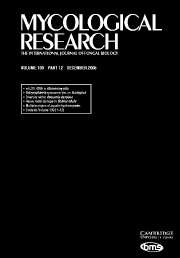Article contents
De novo synthesis is involved in the production of extracellular α-amylase activity from Thermomyces lanuginosus in the stationary phase
Published online by Cambridge University Press: 10 July 2002
Abstract
The thermophilic fungus Thermomyces lanuginosus was cultivated in shake-flasks for up to 120 h with low-molecular-weight dextran as carbon source. Maximal biomass was attained after 48 h of growth whereas extracellular α-amylase activity was highest in the stationary phase with maximum activity after 96 h of cultivation. A similar pattern was found for total extracellular protein. Pulse-labeling of proteins showed that α-amylase and other unidentified proteins were de novo synthesised in the stationary phase. Using specific primers with sequences from α-amylase from T. lanuginosus, RT-PCR analysis showed that α-amylase transcription did not start until late in the growth phase and reached a maximum more than 24 h after maximal biomass was obtained.
- Type
- Research Article
- Information
- Copyright
- © The British Mycological Society 2002
- 3
- Cited by


